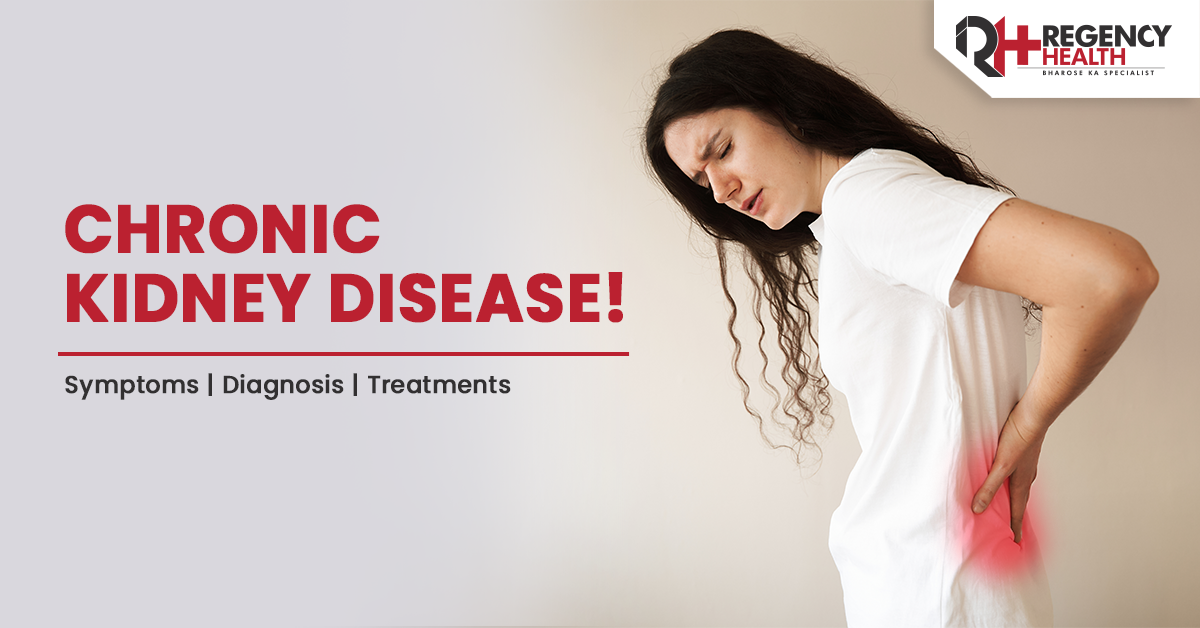Chronic Kidney Disease – Symptoms, Diagnosis & Treatment

Our body is a complex network of multiple organ systems working in tandem. Each organ has a specific function that is vital to our survival and any discrepancies in their functioning can lead to severe health complications. Out of these several body organs, our kidneys are one of the most critical ones and their improper functioning can prove to be quite fatal. Let’s dive deep into the functions of kidneys and what are the major kidney problems that a person suffers. Let us also find out about the symptoms, diagnosis, and treatments.
The kidney’s primary job is to filter out waste from our body in the form of urine. This regular functioning keeps our body fresh and clean. However, Chronic Kidney Disorders (CKD) can hamper kidney functions and result in urine accumulation in the body. This condition is called Hydronephrosis and results in swollen kidneys. Apart from waste accumulation, certain kidney diseases also cause fluids and electrolytes to be stuck in the body causing severe health complications.
Chronic Kidney Disorders develop over some time and are not a sudden occurrence. The kidneys lose their function slowly and this is often detected quite late. This is why we must keep an eye on various symptoms of kidney problems.
Symptoms of Chronic Kidney Disease:
- Feel more tired and have less energy
- Have trouble concentrating
- Have a poor appetite
- Have trouble sleeping or muscle cramps at night
- Have puffiness around your eyes
- Have swollen feet and ankles
- Have dry and itchy skin
- Have to pass urine more often, particularly at night
Kidney disease symptoms are often non-specific and quite general. This means that these symptoms might be a cause of other illnesses as well. This is why acting immediately on kidney disease symptoms is critical.
Diagnosis of Chronic Kidney Disease:
People suffering from diabetes and high blood pressure can also develop several kidney ailments. In addition to this, individuals who smoke and consume alcohol frequently are also at high risk of kidney malfunctioning. Our lifestyle habits, diet, and physical activity can also be determining factors in this aspect. This is why people falling in the above categories must undergo regular health checkups to determine the health of their kidneys.
Physical diagnosis of kidney disease is usually the first step in understanding the situation. Usually, kidney ailments result in an accumulation of fluids in our body and the doctor may use the stethoscope to check for any fluids deposited in the lungs or heart. This physical examination often provides doctors with vital clinical information.
Your blood and urine are one of the most critical indicators of your kidney’s condition. As mentioned earlier, several kidney ailments result in the collection of electrolytes and blood tests are an accurate way of understanding the level of accumulation. Urine tests are also a vital determinant of kidney problems. Our urine is supposed to have certain traces of protein. However, in the case of kidney diseases, the traces of protein are abnormally high. Apart from this, blood and urine tests are conducted to determine the following:
- The presence of Albumin in urine with an Albumin to Creatine Ratio urine test.
- Measuring Creatinine levels in the blood, as it’s a waste product.
- Glomerular Filtration Rate (GFR) to measure your level of kidney function and determine the stage of the kidney disease.
Your doctor may also perform a CT to get a clear picture of the kidneys and urinary tract. This also lets them know the likelihood of facing a kidney stone or tumor. Further diagnosis may include a biopsy of the kidney or observing the kidney tissue under a microscope. In severe
Chronic Kidney Disease Treatment:
Chronic kidney diseases don’t have a specific treatment. However, using the appropriate medication can reduce the pace of their deterioration. In many cases, kidney problems are related to high blood pressure and medicines controlling the blood pressure may also be recommended by doctors. Since kidney swelling (Hydronephrosis) is a result of urine accumulation, doctors may also put the patients on diuretics which can make a person pass urine frequently.
Chronic kidney diseases can also result in low calcium levels and lesser bone density. To counter this, doctors also recommend calcium and Vitamin D supplements.
Dialysis is another common form of kidney ailments treatment followed the world over. This is only done in extreme cases where the patient’s kidneys are totally out of function.
There are two primary kinds of dialysis: hemodialysis and peritoneal dialysis. In hemodialysis, blood is filtered outside of your body, in a machine. And in the case of peritoneal dialysis, a special solution is injected into your abdominal cavity which absorbs excess fluids and waste before they are removed from your body. Because dialysis is usually performed regularly, it is a big lifestyle change and also carries a risk of infection.

 Call-an-Ambulance
Call-an-Ambulance



